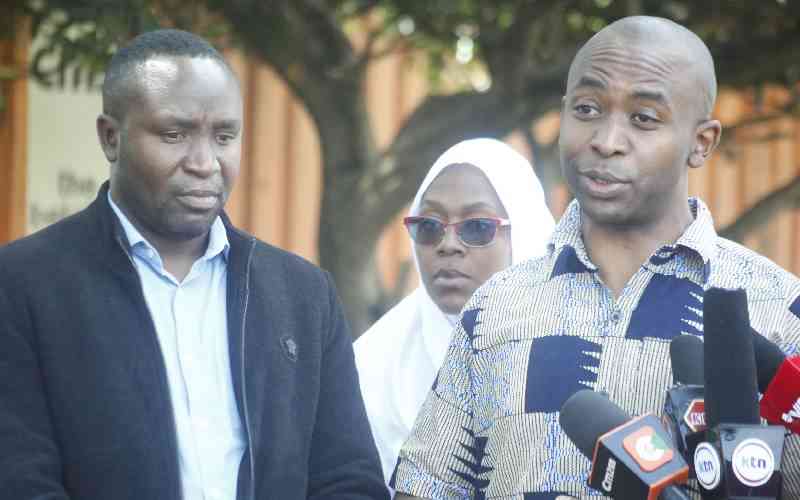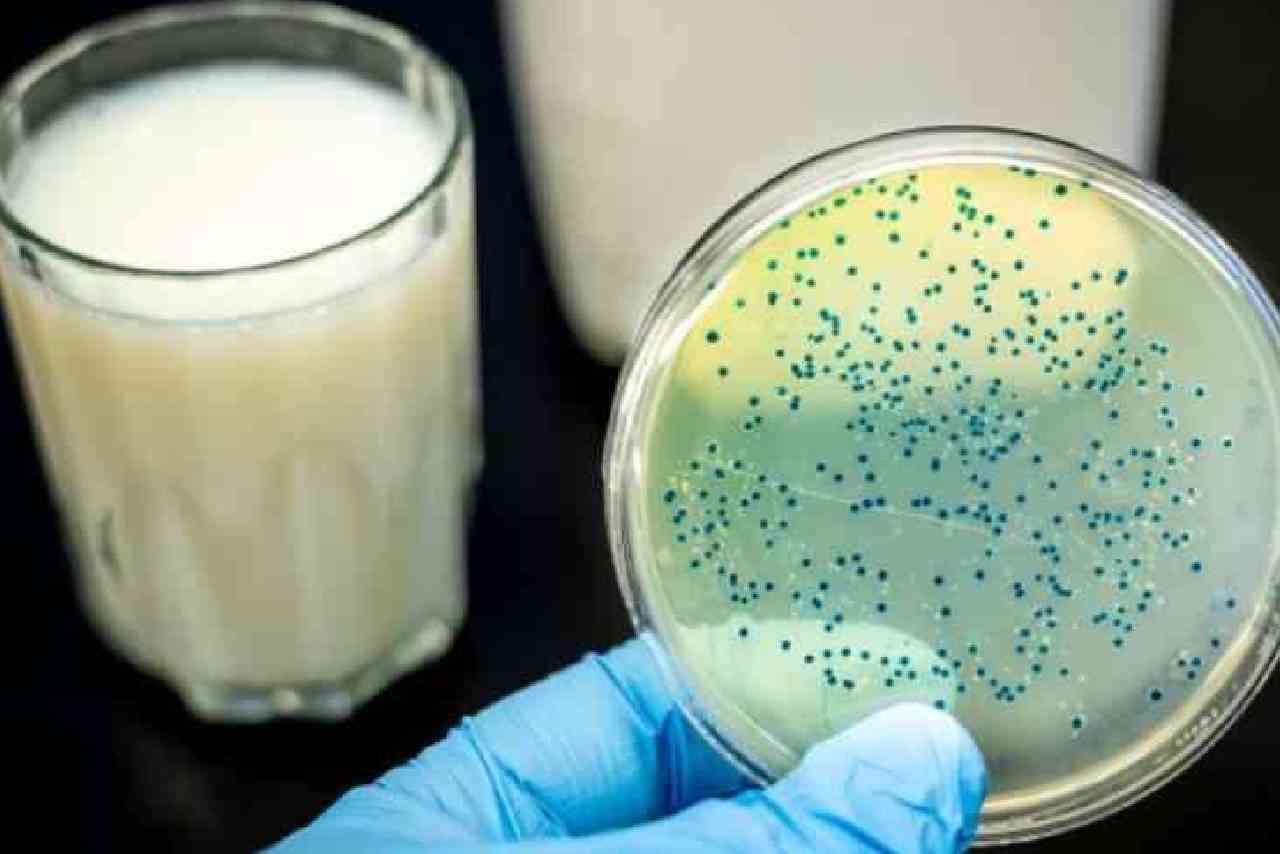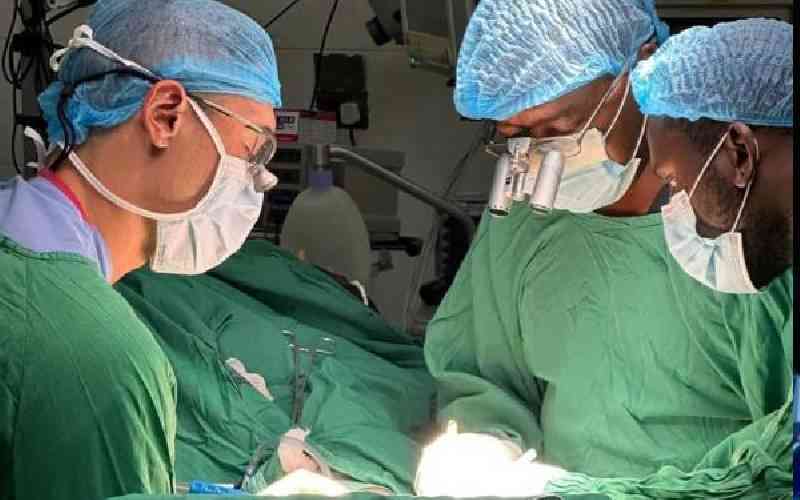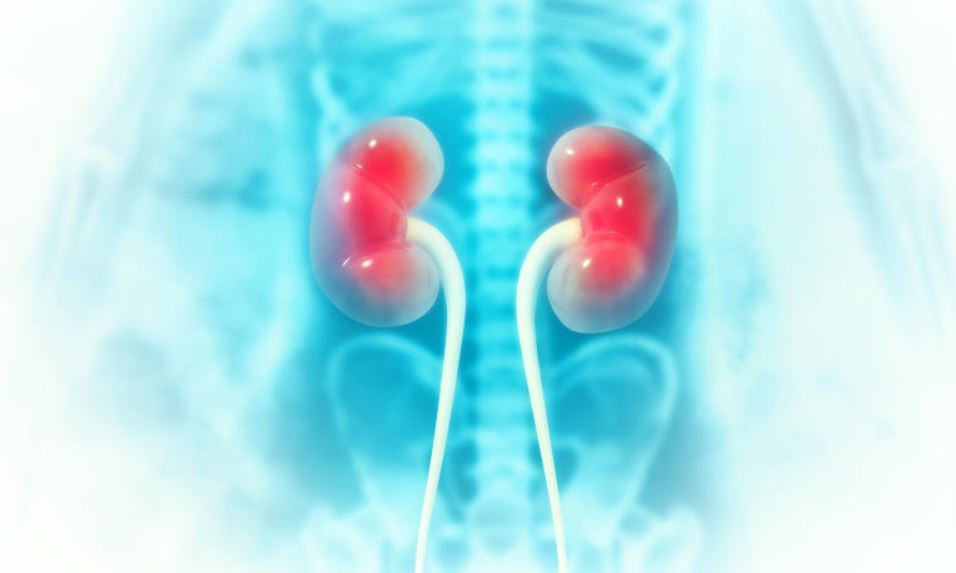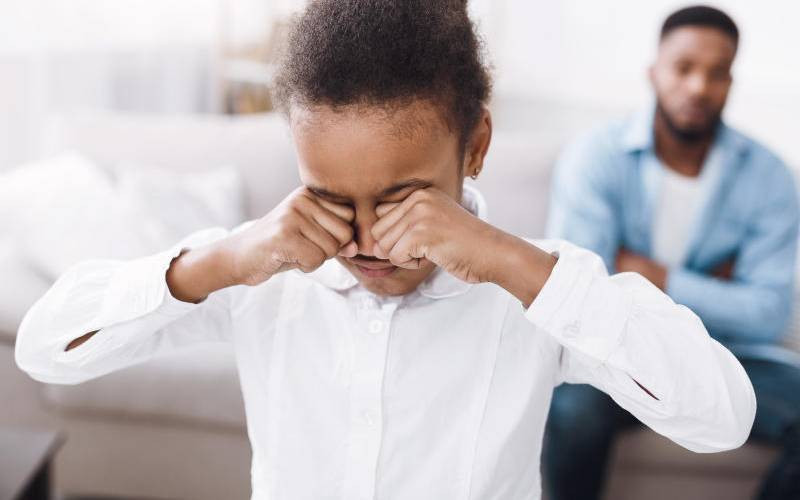
Rape and defilement are crimes under Kenyan law. Yet, between April 2024 and March 2025, 3,464 rapes and defilements were recorded in Kenya by Gender Based Violence Recovery Centre (GVRC). This translates to about 10 every day. Which is sad given that even one incident is one too many.
If you ask Phyllis Atieno*, 25, from Huyani village in Koru, Kisumu county, nothing can prepare a woman for the intense horror of an attack.
In November 2024 she was walking some 15 or so kilometres to the nearest centre, in Koru, when a man, a stranger, blocked her path – threatening to cut her into pieces, a sharp panga in his hand, if she dared to as much as squeak for help.
“He took advantage of the massive sugarcane plantations on either side and the fact that there was no one else along that stretch of road,” she says, the events of that day still fresh in her mind.
Luckily for her she knew what to do. Immediately the ordeal was over, within an hour, she was at the police station in Koru.
“I told the police what had happened. They booked my report and gave me an OB number. Two of them then asked me to take them back to the scene of the incident and I did.”
The disturbed soil in the sugarcane plantation was still moist. The prints of her hand were still visible. Her footprints were still fresh. The perpetrator’s too.
The struggle that had ensued, although one-sided, was visible in stalks of sugarcane that had been left drooping by force from human bodies.
The officers then advised her to head to a health facility nearby and have a trained clinician collect and preserve the evidence on her body.
“When a victim of sexual violence comes to the hospital, it is for two reasons: one to get medical services and two, to collect evidence that would serve the course of justice against the perpetrator,” says Dr John Njuguna, a medical doctor with GVRC and Nairobi Women’s Hospital.
Dr Njuguna has attended to hundreds of women and young girls, brought into hospital after an assault.
He explains: “There are survivors who are brought to the health facility in critical condition. In such situations we swing into action, all hands on deck, to save their lives and to stabilize their vital signs.
“But if they are stable and conscious we offer psychological first aid – which can be done by any trained person. We do this because we need the survivor to be calm and to feel safe so that they are able to tell us exactly what they can remember about the incident, as well as their own medical history. This information would inform what we do next as well as medical tests we will conduct and the treatments we will give.”
Procedures that may or may not be done, depending on the information supplied by the survivor include: a HIV test, a vaginal swab (to check for pre-existing infections), test for hepatitis B, and a pregnancy test
Survivors will be offered prophylaxis against HIV and Hepatitis B – if they don’t have prior established infections. They will also be given prophylaxis against syphilis and gonorrhoea, or treated, if they are already infected.
“These sexually transmitted infections (STIs) are life threatening if left untreated. For survivors who aren’t infected already, prophylaxis will save them the financial burden, and the consequences of ill health, that may come with these infections,” says Dr Njuguna.
For women – and girls – of reproductive age, depending on the nature of the assault, they will be provided with drugs to prevent pregnancy. An unplanned pregnancy, from sexual assault no less, may be a permanent reminder that will force the survivor to relive the ordeal over and over again, notes the medic.
Atieno was able to receive the range of medical and the psychological assistance that Dr Njuguna has talked about. What if she did not have the understanding? Or even worse, what if it is a minor who has been taken advantage of and was not able to articulate the abuse in good time because the perpetrator is their own father? It sounds implausible, doesn’t it?
Well, this is exactly what happened to Joan Anunda*, a girl in Butula, Busia county, in 2023. Aged 7 at the time, her father took advantage of a period of about a week when her mother travelled back to her maiden village to visit her kin.
“I had left the girl to sleep inside her grandmother’s house. I believed she was safe. It turns out that evening her father went to fetch her from the house, telling the old woman that the little girl would be safer with him in our house. That was the first time he abused her. The abuse went on a few more times,” says Faith Adhiambo*, Anunda’s mother.
The little girl never told anyone what was happening because her father had warned [and threatened] her against telling anyone.
Some three or so months later, the girl “begun walking funny: like a duck,” Adhiambo says. “I asked her why she was walking like that but she insisted that she was fine. But then my women friends also took note and one of them told me that someone could be abusing her. That is when I took the initiative to inspect her full body. What I found were grotesque wounds that I had never seen on a child her age. Some of her flesh would come off with her clothes. That was the moment she confessed what was going on. I confronted her father and he feigned ignorance. I took the girl to the police and then to hospital where she was diagnosed with syphilis.”
There is a chance that Adhiambo was infected as well. However, the doctor who treated her daughter explained that since her immune system is developed in comparison to the 7-year-old’s, the symptoms are yet to take root.
Both syphilis and gonorrhoea are treatable with specific antibiotic regimen; administered by a clinician. HIV and Hepatitis B have no cure: “These can only be managed once they are entrenched in the body,” says Dr Njuguna.
Then there is the long journey to fully internalizing the weight of the ordeal: dealing with mental health following the assault.
Catherine Moraa is a psychologist. She counsels rape and defilement survivors. She says: “The journey to healing continues after the hospital process. This is because rape and defilement don’t just affect physical health; they affect mental health that could have far-reaching consequences in the lives of the survivors.”
According to Moraa, defilement could be the source of trauma for a woman in their adulthood; as they struggle to process the ordeal and how it distorted their reality.
“As a psychologist, it is my job to establish if this survivor still needs more psychological therapy. Some survivors may get feelings of self-loathing and might want to self-harm. Some survivors may go into a suicidal spiral. When I am convinced that these are likely, I refer them to a psychiatrist who has the capacity to prescribe medication,” Moraa says.
A survivor, she says, will need regular psychotherapy. Her job during these sessions is to help the survivor process their emotions and feelings fully, and still be able to revert to living their lives. Psychotherapy may last for months, or even years, depending on the extent of the trauma.
In defilement cases, Moraa says, there are two people who will need therapy.
“The first, of course, is the child who was assaulted. We call it child-therapy: which is different from therapy with an adult.
“With children, we try to pick out trauma from the way they are interacting with external stimuli. We place them in an environment that will let the child in them interact. For instance, we offer them games to play. We introduce songs and we sing together. We give them fun stuff to do; like drawing and painting.
“We can be able to pick a lot just from studying how they interact in their natural environment and what they are saying as we talk to them in the language of a child,” she explains.
Frida Mogoi is a clinical officer and child psychologist at Khunyangu sub-county hospital in Busia county. Her job is to perform child friendly services and for paediatric care – especially around defilement cases.
She says: “Children, unlike adults, can be manipulated not to speak the truth. For this reason, I will be keen to their reflexes around specific people, while also communicating to them, at their level, to know that the assault they suffered should never have happened.”
After child therapy psychologists shift their focus to the parents. “We hold sessions with them to establish where they are and how the event has affected them,” says Moraa.
It is not uncommon, Moraa says, to find parents reeling in the aftermath: blaming themselves for the incident.
‘If I was a good parent this would not have happened to my child,’ they could wonder aloud. Or, in some situations, a parent may blame the child.
Penina Okoth*, from Kisumu, ended her business – which was supplementing the family’s income – after her 6-year-old girl was defiled by a 15-year old boy.
“I could not stand the anguish of knowing that had I been more present this would never have happened,” she told this writer. While she has been afforded the services of a counselor, Penina remains adamant that she will not go back to economic activities until all her children are adults and can protect themselves.
Moraa’s advise to survivors of rape or defilement is for them to not assume that they will be alright. “We have qualified psychologists and counselors to help them stabilize their mental health. Do not suffer in silence. And if it is a challenge we can’t handle, there are other experts, like psychiatrists, who are also available to offer treatment.”
Phyllis Atieno’s case is currently ongoing at Tamu Law Courts in Kisumu county. Joan Anunda’s father is right now behind bars at Korinda Prison in Busia county and the case is with the judiciary at Busia Law Courts.
SIDE BAR 1
Why you must report to police and to see a medic in 3 days
Dr John Njuguna said that at the hospital, a survivor should show up for two reasons. One, for her to receive treatment as well as receive prophylaxis against deadly STIs, and prevent an unwanted pregnancy. Reason number two is to collect and preserve evidence that will be essential in obtaining justice.
He says: “We collect evidence first by observing and recording physical trauma sustained by the survivor. We do a vaginal swab to collect biological evidence for forensic analysis.”
The evidence collected by the doctor, or a clinician, will be integral to the arrest and successful prosecution of the perpetrator.
“In a court of law, the case is purely based on evidence. It is therefore critical that survivors are supported to access healthcare centres where they are not only treated but also, critically, have evidence collected and documented to support the case for justice to be achieved” says Judy Gitau, an Advocate of the High Court of Kenya.
Gitau also serves as the regional coordinator for Africa at Equality Now – an international non-governmental with a project dubbed 'Gender Justice ' on ending sexual violence.
In Busia county, Equality Now has partnered with the Rural Education and Economic Enhancement Programme (REEP), a local organization, to provide both legal and practical assistance to survivors of SGBV to access justice and overcome barriers that stall their cases.
“One of the issues we have documented, that contributes to survivor’s not accessing justice, is missing or incomplete evidence owing to delayed access to clinicians” says Gitau.
Hon. Lilian Lewa is the Principal magistrate and head of station at Kwale Law Courts. She ways: “For successful conviction the evidence should be systematic and harmonious in a manner that does not leave me, as the ‘judge’, to doubt if the actual perpetrator could potentially be someone else altogether and not the one presented in court.”
How can you ensure that the evidence is complete and heavy enough to achieve a conviction?
“The standard timeline given for the survivor to show up at the hospital is 72 hours (3 days). It is within this period that evidence would most likely be still available. It is also within this period that we can prevent an unwanted pregnancy from developing and also preventing STIs from taking root in your body. Remember, diseases such as HIV and Hepatitis B, once established, remain incurable.
“But, when I am talking to women, girls or parents, I tell them come immediately after the assault. This increases the chance for us to collect incriminating evidence that points directly at the perpetrator. Therefore, do not wait any longer; do not go home and wait a day to pass; come immediately,” he says.
The aftermath of an assault may prompt one to first want to clean up. Dr Njuguna advises against such a move.
“Do not take a bath and do not change your clothes. If you do, you’ll wash away all the valuable evidence. As for clothes, they could hold valuable clues such as the scene where it happened, the amount of struggle involved, blood and semen samples, all of would help us identify the perpetrator.”
Lilian Twala, a police officer who oversees the gender desk at Malaba police station, says that when a survivor comes to the station, she collects evidence such as, “The extent and type of the assault, where the incident took place, the time when it happened, if they can identify the perpetrator by name or specific description, and so on.”
Both the doctor and the police will be required to come to court as witnesses.
Dr Njuguna says a doctor [and a police officer] are credible sources of evidence in the judicial process against a perpetrator.
And for you, who may be thinking of committing rape or defilement, you should know that the law has already prescribed a sentence.
As per the sexual offences act, rape attracts imprisonment for a term not less than ten years; which can be extended to life imprisonment.
Defilement, against children under the age of 10 automatically attract a sentence of life in prison.
Gitau says: “No one should ever give up. By seeking and achieving justice we make the society a lot safer; preventing the rapist from attacking anyone else.”
 The Standard Group Plc is a multi-media organization with investments in media
platforms spanning newspaper print
operations, television, radio broadcasting, digital and online services. The
Standard Group is recognized as a
leading multi-media house in Kenya with a key influence in matters of national
and international interest.
The Standard Group Plc is a multi-media organization with investments in media
platforms spanning newspaper print
operations, television, radio broadcasting, digital and online services. The
Standard Group is recognized as a
leading multi-media house in Kenya with a key influence in matters of national
and international interest.



